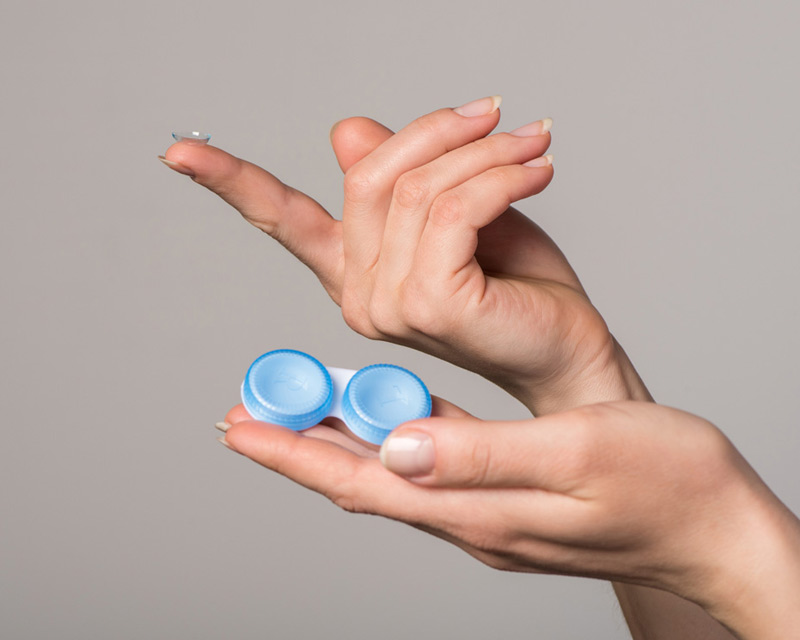
Contact Lenses
Wearing contact lenses provides many wonderful benefits for people who need vision correction. Unlike eyeglasses, they offer people a more natural appearance. They are excellent to correct refractive errors, including nearsightedness, farsightedness, and even astigmatism and achieve excellent vision. They’re comfortable, and they are a great choice for people who play sports or are physically active.
Southern Eye Centers provides a wide range of contact lenses, even for people who have been told in the past that they are “hard to fit” in contact lenses due to keratoconus or other special eye health or visual needs. The doctors fit soft, hard or gas permeable, bifocal, color, astigmatic and specialty contact lenses such as keratoconus lenses and cosmetic lenses.
The first step to get the right contact lenses for your visual needs is the contact lens exam.
Types of contact lenses
Generally, contact lenses fall under three categories: soft, rigid gas permeable, and hybrid.
Soft contact lenses are made of a flexible, water-absorbing material that conforms to the shape of your eye for comfortable wear. They are available in different options and wear schedules to suit your individual needs, including daily disposable, daily wear, extended wear, and frequent or planned replacement.
Rigid gas permeable contact lenses are constructed from a unique hard plastic material that permits oxygen to pass through the lens. These lenses are suitable for individuals with specific vision issues that cannot be corrected by traditional soft contact lenses, such as moderate to severe astigmatism, keratoconus, corneal scarring, or any other condition that affects the shape of the cornea or eye curvature. Rigid gas permeable lenses offer sharp vision correction, a brief adaptation period, and comfortable wear.
Hybrid contact lenses blend a rigid center with a soft outer ring, providing the clear visual correction of a rigid gas permeable lens and the comfort of a soft contact lens.

Order Contacts Online
Refill your contact lens prescription online
Specialty contact lenses
Specialty contact lenses are contact lenses that are designed for specific vision needs or eye conditions that cannot be corrected with standard contact lenses. These lenses are customized to fit the unique shape of the eye and address specific vision needs, such as correcting astigmatism, presbyopia, or irregular corneas. Specialty contact lenses require a prescription from an eye doctor and a customized fitting to ensure they are comfortable and effective.
Toric contact lenses
Toric lenses are a type of contact lens that are designed to correct astigmatism, a condition where the cornea is shaped more like a football than a basketball, causing blurred or distorted vision. Toric lenses are specially designed to fit the unique shape of an astigmatic eye and provide clear and comfortable vision.
Toric lenses are available in both soft and rigid gas permeable (RGP) materials, and can be worn daily, extended wear, or as disposable lenses. They are also available as multifocal lenses for people with both astigmatism and presbyopia, a condition that makes it difficult to focus on close objects.
Multifocal contact lenses
These lenses are designed to correct presbyopia, an age-related condition that makes it difficult to focus on close objects.
Scleral contact lenses
Scleral lenses are a type of specialty contact lens that is designed to fit over the entire sclera, the white part of the eye. Unlike traditional contact lenses that rest on the cornea, scleral lenses vault over the cornea and create a liquid-filled reservoir between the lens and the eye.
Scleral lenses are typically used to correct vision in people with irregular corneas, such as those with keratoconus, corneal dystrophies, or corneal scarring. They can also be used to manage severe dry eye syndrome and other ocular surface diseases.
Scleral lenses provide several benefits over traditional contact lenses. Because they do not rest on the cornea, they can be more comfortable for people with sensitive eyes or corneal irregularities. The liquid-filled reservoir between the lens and the eye can also help to protect the cornea and promote healing in people with certain eye conditions.
Hybrid contact lenses
Hybrid contact lenses are a type of specialty contact lens that combines the benefits of both soft and rigid gas permeable (RGP) lenses. They have a rigid center that provides clear vision and a soft outer skirt that makes them more comfortable to wear than traditional RGP lenses.
Hybrid lenses are designed for people with a variety of vision needs, including those with astigmatism, presbyopia, and irregular corneas. They are also a good option for people who have tried traditional RGP lenses but find them uncomfortable to wear.
Hybrid lenses provide several advantages over traditional contact lenses. The rigid center provides clear vision, especially for people with high astigmatism or irregular corneas, while the soft outer skirt improves comfort and makes the lenses easier to adapt to. They are also more stable on the eye than soft contact lenses, which can rotate or move around.
Cosmetic contact lenses
Cosmetic contact lenses are contact lenses that are designed to change the appearance of the eyes without correcting vision. They are sometimes called “fashion contact lenses” or “colored contact lenses” because they can change the color, shape, or pattern of the iris. They are used for a variety of purposes, such as to enhance the natural eye color, to create a dramatic or exotic look, or to complement a costume or makeup. Some people also use them to correct cosmetic defects such as irregularly shaped pupils or different colored eyes.
Cosmetic contact lenses are available in both prescription and non-prescription forms. However, even if you do not need vision correction, you still need to get a prescription to wear them from an eye doctor to ensure that the lenses fit properly and do not cause any damage to the eyes.
It is also important to purchase cosmetic contact lenses from a reputable source, such as an eye doctor or a licensed retailer, to ensure that they are safe and FDA-approved. Using unregulated or counterfeit contact lenses can lead to serious eye infections and other complications.
